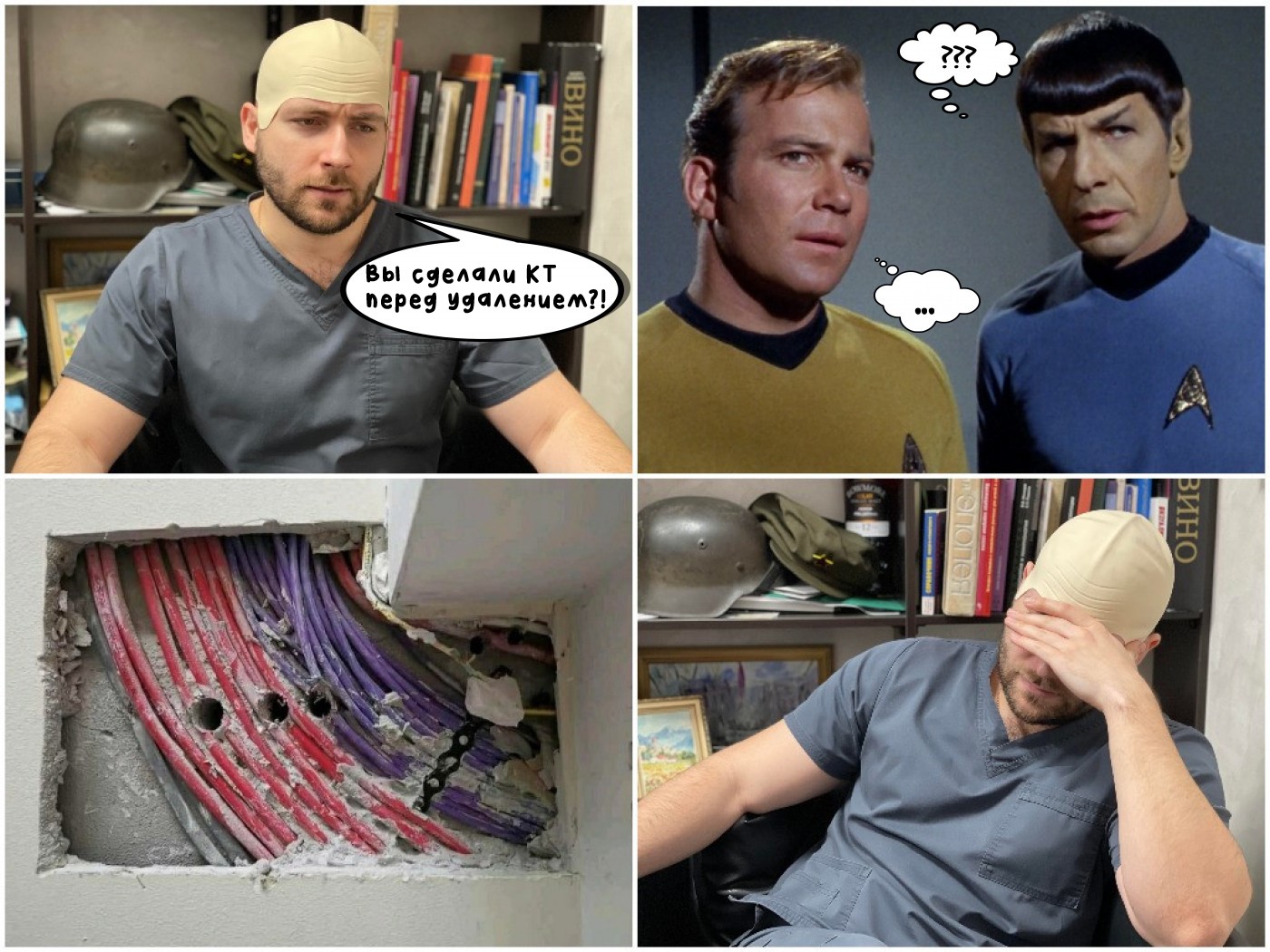
Hello dear friends! By popular demand, I decided to return to the topic of wisdom teeth and touch on the most painful one - "numbness after removal" ("paresthesia"). We all remember the feeling when we lay down our hand (and someone not only remembers, but also practices this trick for personal purposes, if you understand what I mean). The hand is numb, you feel nothing when you touch it. It seems that she is not yours and will have to be amputated. So, a similar feeling can occur not only with the limbs, but also after the extraction of a tooth, in particular, a wisdom tooth. This problem is quite rare and manifests itself in a long-lasting sensation of numbness in the lip and chin area. This is comparable to anesthesia performed on the lower jaw for various purposes, be it treatment or removal. The only thing is that during anesthesia, motor function is also temporarily disturbed, and with paresthesia (due to removal), only sensitivity disappears. The face, as many people think, does not twist, lips close, drool does not flow. Why? Because the motor fibers of the mandibular nerve branch off from the main branch earlier than the site of potential damage.
So why is a problem like numbness possible and how to deal with it?
To begin with, there is NO, I emphasize, NO need to remove such teeth

or, for example, such:

in the maxillofacial hospital NO! I wrote about this in THISarticle. Remember once and for all that the maxillofacial surgeon is not David Blaine or Hmayak Hakobyan and he will not move the nerve away from the tooth. In this case, even if you "blow", a miracle will not happen, whatever one may say. Therefore, it makes no difference WHERE you remove the tooth. It is important WHO will do it. Indeed, in order for numbness to appear, the elementary pressure exerted by the root of the tooth on the nerve during its "rocking" is enough. Of course, there are virtuosos who interrupt the nerve with a boron or tear it apart in the process of removal. Such comrades also call him the "facial nerve". Apparently because the lip and chin are part of the face. I would like to believe that there are only a few such specialists, because the facial nerve passes in a slightly different place. At a minimum, there is computed tomography that allows you to understandwhere and how exactly this nerve (and its name is "mandibular" / "lower alveolar nerve"), passes. On the diagram, number 1:

In addition to the above, numbness can be caused by compression of the nerve by postoperative edema, which can grow within three days, not counting the day of removal. This does not mean that another head grows nearby, but visually swelling is noted. In this case, the sensitivity will begin to recover as the edema subsides. Do not forget that edema is an adequate response of the body to inflammation, which is a protective and adaptive process that occurs in response to tissue damage. Sometimes it happens that a feeling of numbness can persist in the area of the tongue from the side of the operation. Most often this happens at the time of anesthesia, if the doctor hits the lingual nerve with a needle, but not because of the proximity of the roots to the mandibular nerve.
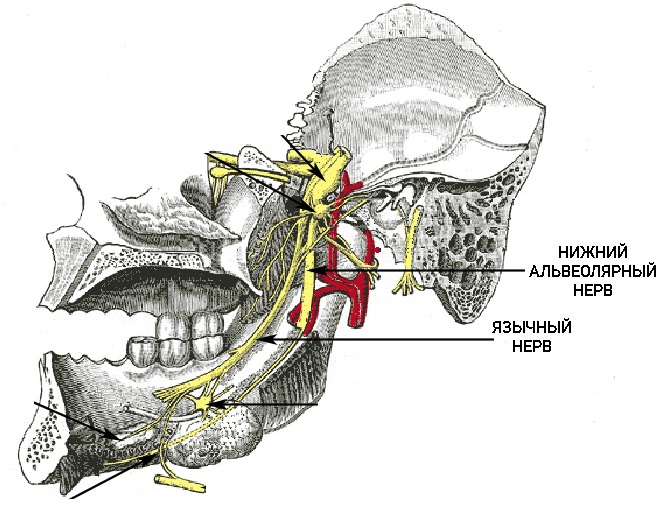
Even if the numbness is not due to swelling, but due to "damage" to the nerve, there is no reason to panic. As soon as possible, preparations of a complex of vitamins of group B are prescribed. As a rule, the next day after the manipulation. Why next? To be able to say for sure - is it paresthesia or the anesthesia has not completely departed. Usually it is "milgamma" or "neuromultvit". They are available both in tablets and in injections. In the event that at home the patient has someone to give an injection or there is a person in front of me with experience, then I prescribe injections for two weeks, and then for two more - pills. If this is not possible, then you can get by with pills throughout the month. This is often enough. Physiotherapy is sometimes prescribed, but personally I am skeptical about this. Physiotherapists forgive me. Don't forget that time is the most important factor.The recovery process is quite lengthy. If in the first month there are noticeable improvements, albeit not obvious ones, then everything will definitely recover. Only a stable numbness can serve as a bell, which does not change for the better in any way for several months. But in this case, you should not panic. The recovery process in case of serious damage can take up to six months on average. Several years ago, I had a patient with acute pain with a figure eight, in the area of which a cyst developed:The recovery process in case of serious damage can take up to six months on average. Several years ago, I had a patient with acute pain with a figure eight, in the area of which a cyst developed:The recovery process in case of serious damage can take up to six months on average. Several years ago, I had a patient with acute pain with a figure eight, in the area of which a cyst developed:
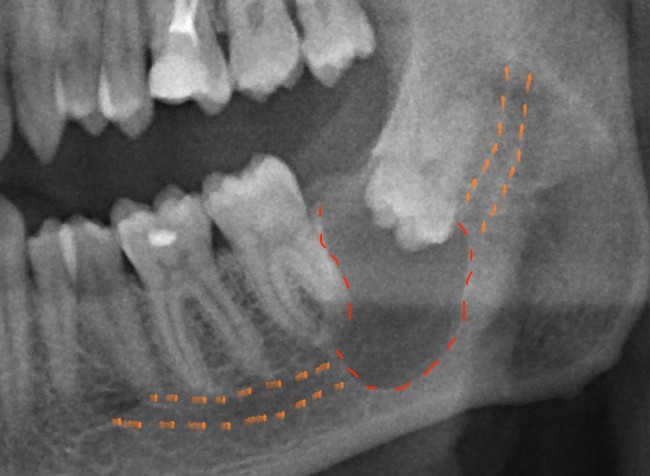
The cyst is marked in red.
Orange marks the canal in which the mandibular nerve passes.
Even before removal, the patient noted a change in sensitivity in the chin area. Explaining all the risks, I said that numbness would be almost certain, but what can you do, an acute condition - the tooth must be removed:
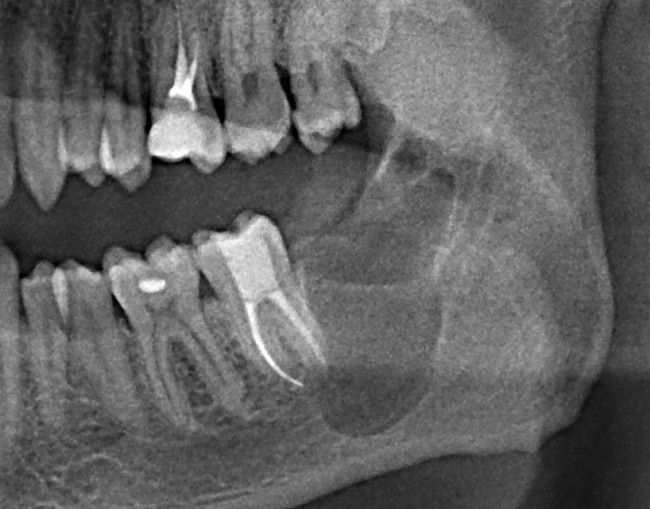
The young man took about 7 months to fully recover his sensitivity. And this happens (canals were treated in the seventh tooth and a filling was installed)
Below is a picture about a year after removal:
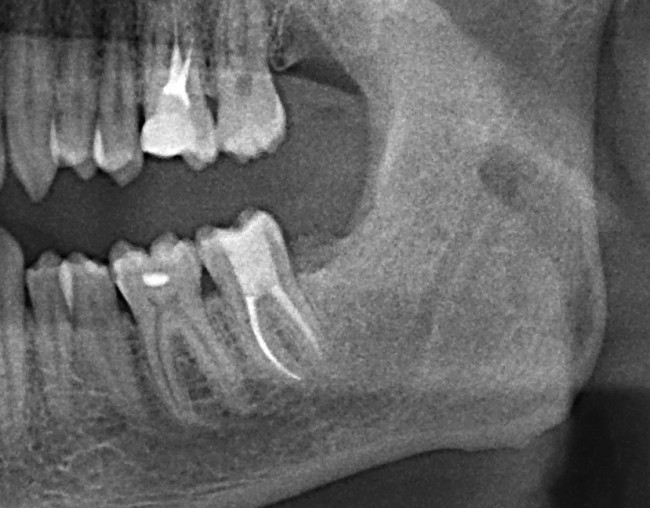
In conclusion, I want to consolidate: first of all, it is necessary to find an experienced doctor who can remove such teeth, and not run to the maxillofacial surgeon or go to the hospital in the hope that there is no such complication as paresthesia. They have enough work more serious than the commonplace wisdom teeth. Although with the fierce frequency with which patients with eights are sent there, doubts creep in.
Stay tuned!
Best regards, Andrey Dashkov
What else to read?
About dental implantation:
- Implant installation: how is it done?
- Bone block transplant in dentistry: how is it done?
- Sinus lifting: how is it done?
- Cleavage in dentistry: how is it done?
- The total denture on implants
- Sinus lift and single-stage implantation
- implantation in the absence of teeth, as a result of delayed treatment to the dentist
About wisdom teeth and their disposal:
- Wisdom teeth: You can not delete leave
- Consequences of untimely removal of wisdom teeth
- removal of wisdom teeth. How it's done?
- ChLH or not ChLH? That is the question ...
- Wisdom teeth: Pull-pull!
About professional oral hygiene:
- Professional oral hygiene. Part I. Introduction
- Professional oral hygiene. Part II: How is it done?
And, of course:
- Tooth extraction, "inexpensive" ... consequences
- Dentistry: expectation and reality
- Recommendations after the appointment of a dental surgeon
- The naked truth (article on the formation of the cost of treatment in a dental clinic) Total prosthetics on implants